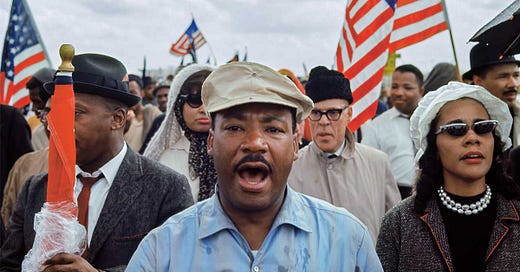Train in Nonviolence with the King Center
Learn the philosophy and practice that powered the Civil Rights Movement
I’ve been wanting to offer this training, literally, for years. If you’d like to see more practical opportunities to get equipped like this one, become a paid subscriber today.
We are living in a political situation that increasingly requires protest.
Masked ICE agents are abducting people off the street and sending them to horrific incarceration centers.
The Big Ugly Bill gives tax breaks for the mega-rich while stripping healthcare and increasing financial burdens from the poorest among us.
The Supreme Court is paving the way for more abuses of authority.
These times call for protest.
But what will be the nature of our protest?
Will we meet violence with physical force, or will we follow the example of the nonviolent activists of the Civil Rights movement?
In his “Letter from Birmingham Jail,” Martin Luther King, Jr. explained:
In any nonviolent campaign there are four basic steps: collection of the facts to determine whether injustices exist; negotiation; self-purification; and direct action.
Writing on scraps of newspaper in his cramped jail cell, King patiently walked his readers through the process of coming to Birmingham to protest.
They researched, attempted to persuade local leaders through reasoned conversation, then, when that failed, they began a period of introspection in preparation for protest.
King continued,
We had no alternative except to prepare for direct action, whereby we would present our very bodies as a means of laying our case before the conscience of the local and the national community.
Mindful of the difficulties involved, we decided to undertake a process of self-purification.
We began a series of workshops on nonviolence, and we repeatedly asked ourselves: “Are you able to accept blows without retaliating?” “Are you able to endure the ordeal of jail?”
It seems like many people today think that civil rights protestors got angry at injustice and then simply took to the streets and started marching.
Not true.
During the Civil Rights movement, activists underwent extensive training to prepare their minds, hearts, and bodies for the struggle ahead.
They knew they were putting themselves in the path of armed, violent, bloodthirsty forces when the protested. In order to develop the inner fortitude to endure the challenge they were about to face, they trained.
King said they attended “workshops on nonviolence.”
These sessions challenged protestors to count the cost of their actions and decide if they were really willing to absorb the abuse of their opponents without resorting to violence.
Violence or Nonviolence?
Today we are confronted with the same choice: violence or nonviolence.
We look back on historical heroes such as Martin Luther and Coretta Scott King, John Lewis, Fannie Lou Hamer, and Prathia Hall with admiration.
They exhibited courage in the face of direct and violent opposition. They confronted batons and bullets with the strategy of nonviolence.
They put their bodies at risk to demonstrate that the greatest force is not physical, it is moral.
Through it all, they drew on their faith as a source of strength and resilience.
As much as we admire the people who fought for civil rights, will we emulate their approach?
We can and we must.
Today, the tradition of nonviolence must be continued.
You’re Invited to the King Center Online Nonviolence Training
I am pleased to invite you to join me for a live, online nonviolence training conducted by the King Center in Atlanta.
Established as “The Center for Nonviolent Social Change”, the King Center continues the tradition of nonviolent protest employed by the King family and countless others.
Now you have the opportunity to become the civil rights activists our nation needs today.
We need your energy, your presence, your passion.
But you need training.
In this training you will learn:
The concepts of Beloved Community and the World House
The types and stages of conflict
The steps and principles of nonviolence
Nonviolence as a spiritual practice.
As a special bonus for our Footnotes Substack readers, you will also get access to the Nonviolence 365 online platform for deeper dive into Kingian nonviolence and discounted products from the King Center bookstore.
The King Center nonviolence training takes place live on line with an experienced facilitator on
Saturday, July 19
12 pm - 3 pm ET
Cost: $50 (scholarships available; email: info@jemartisby.com)
Watch this video for clarifications
When you add the $79 training to your cart, the cost will automatically drop to $50. When you enroll, you will receive a separate email with the link for the live event. There will be a recording sent to all registrants if you aren’t available for the live event.
There is no limit on the number of attendees, so please share with your church, faith community, or circle of friends.
Many people are asking in this moment, “What can we do?”
Here is one answer: Get trained in the philosophy and tactics of nonviolence so you can continue the tradition of civil rights activism.





In 1969-1970 I was involved with training in non-violent protest with the American Friends Service Committee.
It is vital to practice role play that exposes each individual’s breaking point. We all have one. Remaining calm and brave and resolute when under attack contradicts our innate biology.
How can we older allies subsidize scholarships for younger adults?
This is real hard stuff, for real. The blows, the sacrifices, the humiliation. It frightens me, I don't know that I'm up to it physically, mentally, and emotionally. Everything in me screams NOOOO. The level of courage this takes scares me. But I know that once I say yes to it, there's no turning back.